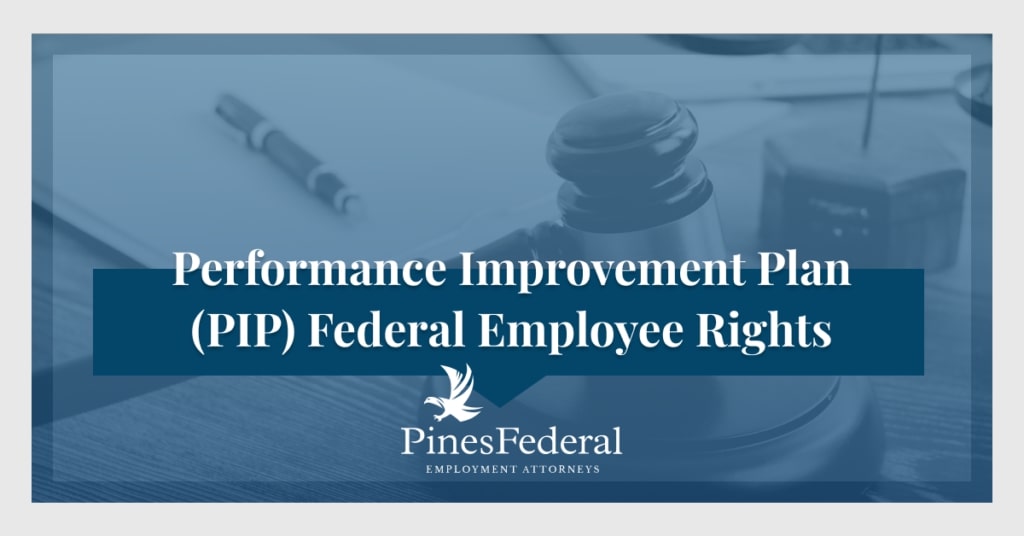
Federal employees enjoy many perks other employees do not, including that federal employment is not at will.
That means, for your supervisor to fire you, they have to provide not only a reason but a legitimate reason that is clearly communicated to you.
They must also offer you a chance to improve your performance through a performance improvement plan.
Federal employee rights protect you when you are placed under a PIP, requiring several specific steps be taken before you can be fired or demoted based on performance.
At Pines Federal, we exclusively defend federal employees against unfair employment practices. Our MSPB lawyers can help you respond to a PIP and potentially beat it, preventing your employer from forcing you out of your job.
Please call (800) 801-0598 or fill out our online form today for assistance.
Please be aware: Our practice focuses on full-time federal employees only. We encourage contract employees/contractors to reach out to another firm. However, if you are a federal contractor who is supervised by a federal employee and have suffered discrimination or retaliation, we may be able to help.
What Is a Performance Improvement Plan?

Federal law regulates when and how federal employees can be fired.
There are two reasons to fire a federal employee: unacceptable conduct and performance issues.
Before the government can fire you for performance-based issues, it must place you on a PIP.
Before it can place you on a PIP, it must notify you that it considers your performance unacceptable.
Performance Plans
Every federal agency must implement an appraisal system establishing criteria for evaluating employee performance and a process for communicating that evaluation to the employee. The typical evaluation period is one year.
For each year, the employee is subject to a performance plan. That plan must identify the “critical” elements of the employee’s work. It may also include “non-critical” and “additional” elements.
Critical elements are aspects of your work that must be performed acceptably for your work to be considered acceptable.
Non-critical elements are other aspects of job performance like “objectives, goals, program plans, work plans, and other means of expressing expected performance.”
These elements are part of evaluating overall performance. Additional elements are other work aspects that do not contribute to the performance rating.


“I have never been involved in a court case before and was scared to make even the first phone call to seek legal counsel. I found Pines Federal after reviewing several offices…My case was settled to my satisfaction and I can’t recommend this practice enough…”
Rating Performance
Based on the critical elements in your performance plan, your supervisor ranks your performance on a five-point scale. The scale begins at one, “Unacceptable,” to three, “Fully Successful,” up to “Outstanding” at level five.
Only failure to adequately perform critical duties can justify rating your performance as unacceptable. Whenever a supervisor determines that you have performed unacceptably, they must inform you of what critical elements you failed to meet in writing and specify how to meet them.
The PIP
The appraisal program must provide a mechanism to assist employees who have received an unacceptable performance rating and “a reasonable opportunity” to improve their performance.
Most employers use a PIP. The PIP defines specific goals for your work to become acceptable. It must also provide you with a time frame to improve.
If you meet the requirements of the PIP, the supervisor cannot fire you. However, the supervisor can fire or demote you if you do not meet the requirements. If they do, they must give you 30 days advance notice and the opportunity to defend yourself.
I Received a Performance Improvement Plan; Should I Quit?
If you were put on a performance improvement plan, it’s generally not a good idea to quit unless you find another job first. You can beat the PIP, even if it was secretly created to force you out.
Additionally, quitting can make you ineligible for unemployment benefits and can limit your opportunities to challenge your employer’s actions.
How to Respond to a Performance Improvement Plan
In theory, PIPs sound like a good way to retain talented employees while weeding out employees unsuited to their positions. In reality, PIPs are often used to push employees out based on discriminatory intent or because a supervisor has personal animosity.
Consider Potential Motivations
If you receive an unfair performance improvement plan, it may be tied to covert discrimination. Sometimes you can identify this through a pattern or practice where only people with certain characteristics are placed on PIPs.
Other times, supervisors make comments that reveal their true feelings, intentionally or unintentionally.
Responding to the PIP
If you are ever placed on a performance improvement plan at work, it is wise to consult with an attorney. They can help pressure your supervisor to comply strictly with the letter of the law through the PIP process.
Ensure the PIP:
- Identifies all critical elements and only critical elements;
- Clearly communicates how you can raise your performance to acceptable levels;
- Is consistent with your prior “unacceptable” performance rating; and
- Is consistent with your performance plan.
Next, respond to the PIP. You may need to request clarification on the expectations of the job or the plan, or you may need to refute claims the supervisor is making.
Send regular, written documentation concerning your progress to your supervisor, including exactly how you have met each PIP goal. Be prepared with as much evidence as possible to prepare for the possibility of receiving notice you will be fired or demoted.
Contact a Federal Employment Attorney About Your PIP
Being placed on a PIP can be scary and demeaning. Too often, a PIP is a front for some other reason your supervisor wants to push you out.
When a PIP is illegitimate, based on inaccurate facts, unclear or unrealistic expectations, or just unfair, you can usually beat it. At Pines Federal, we have helped many employees conquer unfair PIPs.
We can help you respond, no matter what stage in the process you are at. Contact us online or call (800) 801-0598 today.